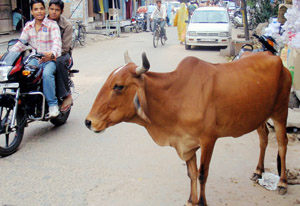Mumbai, Apr 29: The Bombay High Court today declined to stay provisions of a recent Maharashtra law which prohibits possession, transportation and consumption of meat of cow, bulls and bullocks even if the animals have been slaughtered outside Maharashtra.
A division bench headed by Justice V M Kanade was of the view that no stay can be given until the final hearing of a bunch of petitions challenging the beef ban which was fixed on June 25.
The court asked the state government to file a detailed affidavit on the issue within four weeks and allowed the petitioners and intervenors to file rejoinders two weeks thereafter.
The Maharashtra Animal Preservation (Amendment) Act, enforced last month by the state government, bans slaughter of cows, bulls and bullocks and also consumption and possession of their meat.
Three petitions were filed challenging Sections 5(d) and 9(a) of the Act which prohibits possession, transportation and consumption of meat of cow, bulls and bullocks even if the animals have been slaughtered outside Maharashtra.
According to the petitions, this puts a ban on import of meat. The petitions sought a stay on these sections.
In another development, the court directed the state not to take any coercive action till pendency of petitions or three months against traders who have been found in possession or transportation of beef.
"This is because the Act had been introduced suddenly and reasonable time was not given to the traders to dispose of their products," said the Judges.
However, FIRs can be registered against such traders but no further action can be taken until the petitions are decided finally or three months whichever is earlier, the court said.
The court also clarified that since ban on beef continues in the State under the Act, FIRs can be registered against slaughter of cows, bulls and bullocks.
As a note of caution, the Court also said that the state shall not intrude on the privacy of citizens to find out if they are in possession of beef or any other form of meat.
The court clarified that no blanket stay can be imposed on the provisions of the Act which ban transportation or possession of beef, though FIR can be registered against the offenders under the Act.
The judges said they were of the view that the traders had not been given reasonable time to dispose of the beef products as the Act was brought in all of a sudden. Hence they directed the State not to take coercive steps against them though FIR can be registered.
"There can be no compelling reason for the State to impose ban without giving a reasonable opportunity to traders provided they abided by the rules on food hygiene and safety," said the division bench in their brief order.
Senior counsel Aspi Chinoy, appearing for one of the petitioners, had argued that such a ban on consumption was violative of the fundamental right of a person to have his choice of food.
"Section 5 (d) is extremely invasive, drastic and intrusive. There is no real justification behind making possession and consumption of beef a cognisable offence.
The government should not arbitrarily invade the rights of citizens," Chinoy argued.
He said that the state has not even contemplated regulation of import of meat.
"Five states in India, including Uttar Pradesh, Punjab and Haryana, have permitted import of beef despite a ban on slaughter of those animals. And in these states passion go high in such matters but it is still allowed," Chinoy said.
Advocate General Sunil Manohar had, however, argued that consumption of beef is not a fundamental right of a citizen and the state government can regulate a person's fundamental right to have his choice of food.
"It is not a fundamental right of a citizen to eat beef. It cannot be said that the government cannot take away these rights. The state legislation can regulate consumption of flesh of any animal the source of which is reprehensible. Under the Animal Protection Act, there is a prohibition on consumption of wild boar, deer and other animals," he argued.
Manohar further argued that if section 5(d) of the Act, which prohibits possession of meat, is struck down then the Act would remain only on paper and it would frustrate the purpose and object of the Act which is to protect cow progeny.






Comments
Add new comment